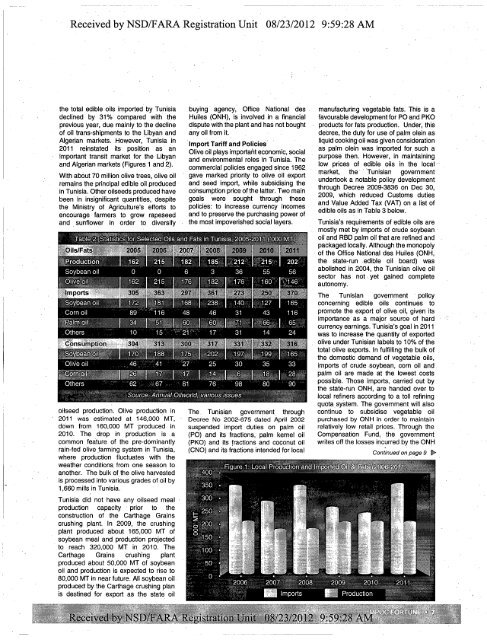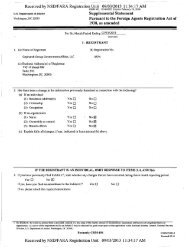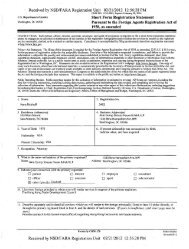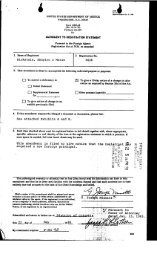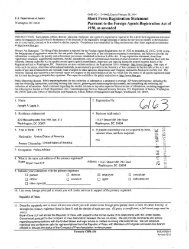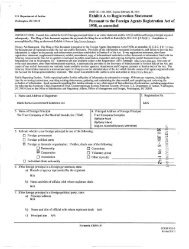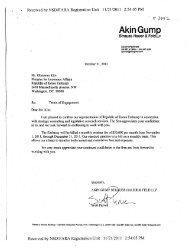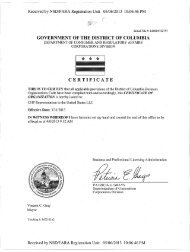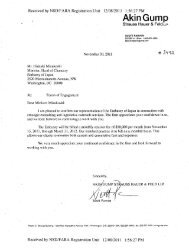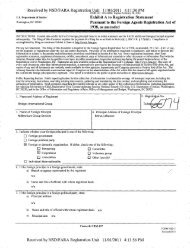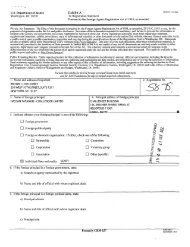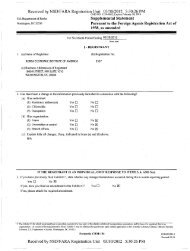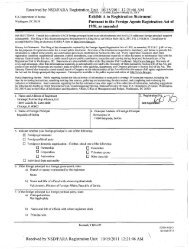Supplemental Statement - FARA
Supplemental Statement - FARA
Supplemental Statement - FARA
You also want an ePaper? Increase the reach of your titles
YUMPU automatically turns print PDFs into web optimized ePapers that Google loves.
Received by NSD/<strong>FARA</strong> Registration Unit 08/23/2012 9:59:28 AM<br />
the total edible oils imported by Tunisia<br />
declined by 31% compared with the<br />
previous year, due mainly to the decline<br />
of oil trans-shipments to the Libyan and<br />
Algerian markets. However, Tunisia in<br />
2011 reinstated its position as an<br />
important transit market for the Libyan<br />
and Algerian markets (Figures 1 and 2).<br />
With about 70 million olive trees, olive oil<br />
remains the principal edible oil produced<br />
in Tunisia. Other oilseeds produced have<br />
been in insignificant quantities, despite<br />
the Ministry of Agriculture's efforts to<br />
encourage farmers to grow rapeseed<br />
and sunflower in order to diversify<br />
buying agency, Office National des<br />
Huiles (ONH), is involved in a financial<br />
dispute with the plant and has not bought<br />
any oil from it.<br />
Import Tariff and Policies<br />
Olive oil plays important economic, social<br />
and environmental roles in Tunisia. The<br />
commercial policies engaged since 1962<br />
gave marked priority to olive oil export<br />
and seed import, while subsidising the<br />
consumption price of the latter. Two main<br />
goals were sought through these<br />
policies: to increase currency incomes<br />
and to preserve the purchasing power of<br />
the most impoverished social layers.<br />
Oils/Fats 2005 2006 2007 2008 2009 2010 2011<br />
GfeffiMBga v 7 ir*W "|l-€«nF<br />
0 0<br />
i rearaiJf ra »•&<br />
Imports 305 363 297 361 273 250 370<br />
Wi'VWW<br />
Corn oil<br />
laajfcMi<br />
Consumption<br />
K=VR*.V>IL!<br />
fw^rm lei.: 238. 1^140=7 j|j|127 | 165<br />
46 31 4'<br />
m<br />
m<br />
304 313 300 317 331 332 316<br />
rr#- m<br />
H|9S .p65'! i<br />
O hve on 35 33<br />
Others<br />
Pi!<br />
Sc<br />
oilseed production. Olive production in<br />
2011 was estimated at 146,000 MT,<br />
down from 160,000 MT produced in<br />
2010. The drop in production is a<br />
common feature of the pre-dominantly<br />
rain-fed olive farming system in Tunisia,<br />
where production fluctuates with the<br />
weather conditions from one season to<br />
another. The bulk of the olive harvested<br />
is processed into various grades of oil by<br />
1,660 mills in Tunisia.<br />
Tunisia did not have any oilseed meal<br />
production capacity prior to the<br />
construction of the Carthage Grains<br />
crushing plant. In 2009, the crushing<br />
plant produced about 165,000 MT of<br />
soybean meal and production projected<br />
to reach 320,000 MT in 2010. The<br />
Carthage Grains crushing plant<br />
produced about 50,000 MT of soybean<br />
oil and production is expected to rise to<br />
80,000 MT in near future. All soybean oil<br />
produced by the Carthage crushing plan<br />
is destined for export as the state oil<br />
m m<br />
v&M!&mBs&<br />
The Tunisian government through<br />
Decree No 2002-675 dated April 2002<br />
suspended import duties on palm oil<br />
(PO) and its fractions, palm kernel oil<br />
(PKO) and its fractions and coconut oil<br />
(CNO) and its fractions intended for local<br />
*»<br />
J Ml I'" "' n n<br />
••- ^Mpftsiiss jaaMwg^wft'T'" •ill r '<br />
\hr\ V<br />
:::::i:2006 2008: " ** ! 2009<br />
manufacturing vegetable fats. This is a<br />
favourable development for PO and PKO<br />
products for fats production. Under, this<br />
decree, the duty for use of palm olein as<br />
liquid cooking oil was given consideration<br />
as palm olein was imported for such a<br />
purpose then. However, in maintaining<br />
low prices of edible oils in the local<br />
market, the Tunisian government<br />
undertook a notable policy development<br />
through Decree 2009-3836 on Dec 30,<br />
2009, which reduced Customs duties<br />
and Value Added Tax (VAT) on a list of<br />
edible oils as in Table 3 below.<br />
Tunisia's requirements of edible oils are<br />
mostly met by imports of crude soybean<br />
oil and RBD palm oil that are refined and<br />
packaged locally. Although the monopoly<br />
of the Office National des Huiles (ONH,<br />
the state-run edible oil board) was<br />
abolished in 2004, the Tunisian olive oil<br />
sector has not yet gained complete<br />
autonomy.<br />
The Tunisian government policy<br />
concerning edible oils continues to<br />
promote the export of olive oil, given its<br />
importance as a major source of hard<br />
currency earnings. Tunisia's goal in 2011<br />
was to increase the quantity of exported<br />
olive under Tunisian labels to 10% of the<br />
total olive exports. In fulfilling the bulk of<br />
the domestic demand of vegetable oils,<br />
imports of crude soybean, corn oil and<br />
palm oil are made at the lowest costs<br />
possible. Those imports, carried out by<br />
the state-run ONH, are handed over to<br />
local refiners according to a toll refining<br />
quota system. The government will also<br />
continue to subsidise vegetable oil<br />
purchased by ONH in order to maintain<br />
relatively low retail prices. Through the<br />
Compensation Fund, the government<br />
writes off the losses incurred by the ONH<br />
Production<br />
Roi-eiwd In \M> I \R \ Rcjistrulion I nil OS 23 2012 :5 1 >:2


